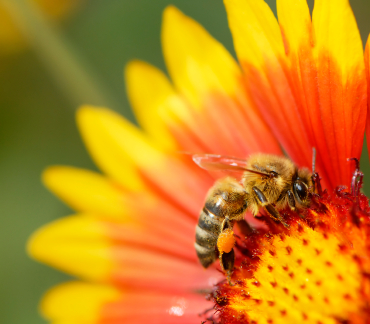Honeybees (Apis mellifera L.) are in trouble. And for those who thought it was the end of the colony collapses witnessed initially in Europe and America from 2007 — and that now it was business as usual for our little friends – that’s just not the case.
Seventy five percent of agricultural crops benefit from animal, and especially bee, pollination, while 10% of this is entirely dependent on it. Agriculture has changed a lot with modern hybrids and now patented genetically modified crops, but a lot of high value fruits, vegetables, nuts and oil crops still need to be pollinated to produce viable fruits or seeds.
Among the crops fully dependent on bee pollination are (alphabetically): almonds, apples, apricots, avocadoes, blueberries, broccoli, carrots, celery, cherries, citrus fruits, cranberries, cucumbers, grapes, legume seed vegetables (beans, peas, lentils, etc.), macadamia nuts, nectarines, olives, peaches, peanuts, pears, plums, squash, strawberries, sugar beets, sunflowers and watermelons.
Many thousands of non-cultivated plants are also dependent on bees for pollination, and it is a travesty that many of the wild (indigenous) bee populations have disappeared, and are having to be replaced by increasingly in-bred ‘managed’ honeybees.
What to do to understand more about bee population collapse
To understand more about the recent decline in bee populations, and especially the role of neonicotinoid insecticides, we urge you to do one or more of the following:
- Watch the short video by Dr Rob Verkerk below. With his academic background in sustainable agriculture and entomology, this is a subject very close to his heart.
- Read Sam Burcher’s article on the vanishing of the bees, which alludes to the film on the subject.
- Watch the film, Vanishing of the Bees
What you can do to help the bees
Signing the Avaaz petition to Save the Bees, calling on Bayer to withdraw it’s neonicotinoid, imidacloprid, the world’s number one selling insecticide. The Bayer shareholder’s meeting that the petition targeted, failed to be swayed by nearly one million signatures this week. But Avaaz has rightly said keep the signatures flowing, let’s hit the million mark and then see what can be done to influence the situation further.
- Support Neal’s Yards campaign, and their petition for a UK ban on neonicotinoids
The UK, unlike France, Italy, Slovenia and Germany, has not reduced usage of any neonicotinoids — and has probably the worst problem with bee colony collapse. Neal’s Yard Remedies Bee lovely Petition, open until October 2012, is attempting to put pressure on the British government to bring in restrictions on neonicotinoids. If you’re a UK resident, please sign this petition.
- Grow plants attractive to bees.
For those with a back garden, ensure you have a good sequence of flowing plants attractive to bees throughout the growing season.
- Become a hobby beekeeper.
You can set up a simple top-bar beehive in your back garden, either make one yourself or they can be bought as a kit. There are ample resources readily available on the Internet to help you on your way if you decide to set up your own hive.








Comments
your voice counts
03 May 2012 at 1:28 am
As a Jew I have always been an underdog. From this point of view I am instinctively sympathetic to the underdog in almost any situation. Given their current man-made jeopardy I consider bees to be an underdog in need of support. For us to domesticate a wild lifeform and benefit from its selfless activity brings with it the obligation to maintain it in its healthiest state. Otherwise we might just as well pour arsenic in our drinking water and have done with it!
03 May 2012 at 5:01 am
health before money then we will have money to spare.we are destroying the planet,air,water and land by the the few people in power who are phsycopathic by nature who are driven by power and greed only and can turn a blind eye to what they might be doing to the people of the world including their own relatives. they no its wrong but like the nazies of germany to scared to stand up and be counted. they will perish with the rest of us. m.g collins nz.
23 May 2012 at 1:54 am
Please see meta analysis of studies showing how the radiation from mobile phone masts is destroying the bees' immune system thus leaving them no defenses to protect them from other toxins.
http://www.kompetenzinitiative.net/broschuerenreihe/brochure-series/english/bees-birds-and-mankind.html
Bees, Birds and Mankind Destroying Nature by `Electrosmog´
Dr Ulrich Warnke
Dr Ulrich Warnke summarizes the findings of his brochure as follows:
"Today, unprecedented exposure levels and intensities of magnetic, electric, and electromagnetic fields from numerous wireless technologies interfere with the natural information system and functioning of humans, animals, and plants. The consequences of this development, which have already been predicted by critics for many decades, cannot be ignored anymore. Bees and other insects vanish; birds avoid certain places and become disorientated at others. Humans suffer from functional impairments and diseases. And insofar as the latter are hereditary, they will be passed on to next generations as pre-existing defects"
Your voice counts
We welcome your comments and are very interested in your point of view, but we ask that you keep them relevant to the article, that they be civil and without commercial links. All comments are moderated prior to being published. We reserve the right to edit or not publish comments that we consider abusive or offensive.
There is extra content here from a third party provider. You will be unable to see this content unless you agree to allow Content Cookies. Cookie Preferences